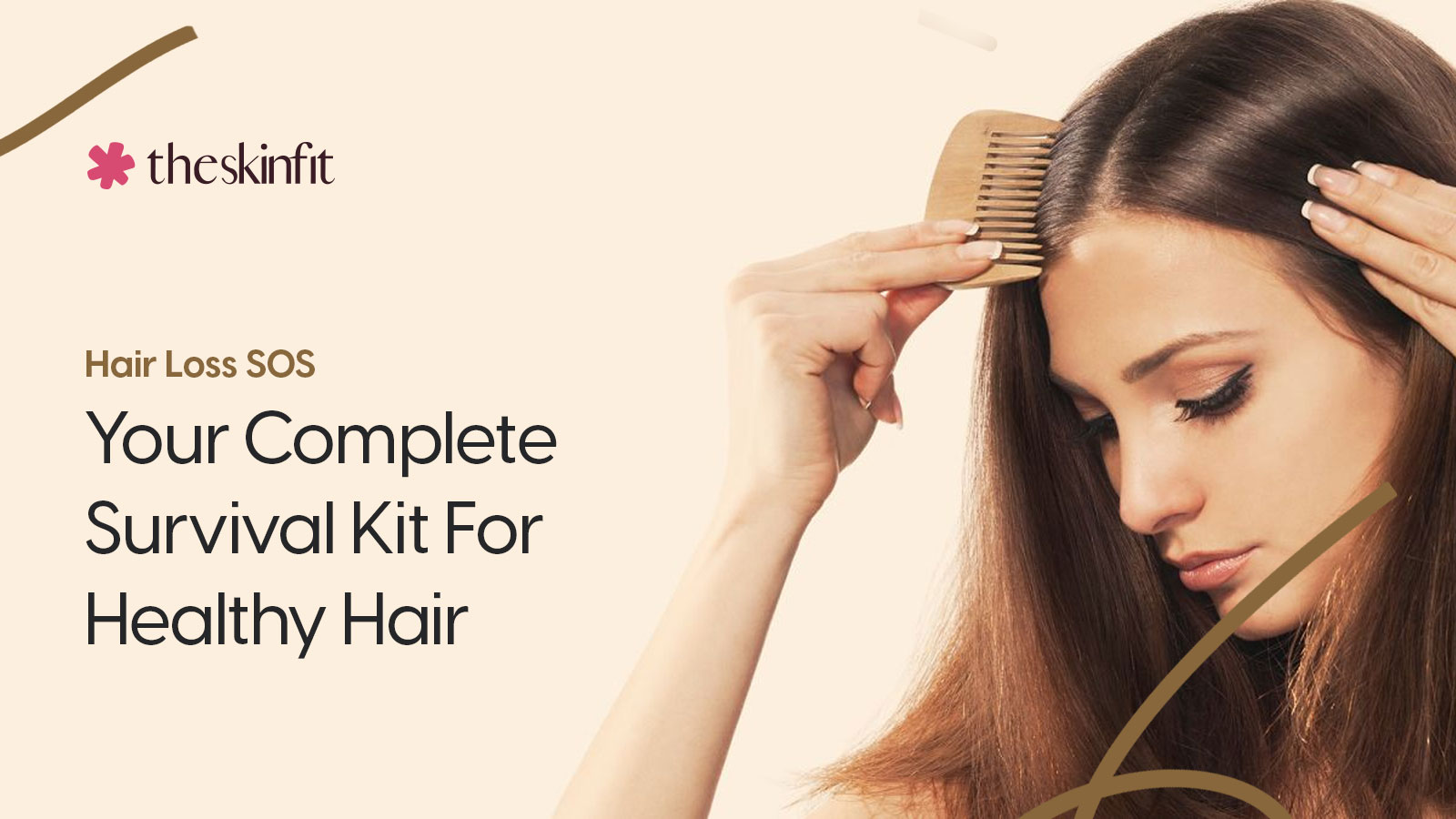Don't worry; we've got you covered! In this all-inclusive guide, we'll explain what causes hair loss, look at some solutions, and spill the beans on the best way to fight those pesky follicle enemies for good. Now is the time to say goodbye to hair loss and welcome a gorgeous mane that commands attention everywhere you go.
Hair loss is a frequent problem that both men and women face. It may not be very comforting and affect one's self-esteem. Understanding the reasons and developing effective therapies is critical. This post will cover the problem of hair loss, alternative treatment methods, and the best shampoos for hair loss.
What Is Hair Loss?
Alopecia, or hair loss, is a disorder with partial or total hair loss from the scalp or other body parts. It is a widespread issue that affects both men and women. Genes, hormones, illness, and even your daily routine all play a role in your risk of balding.
Hair loss is a reduction in density and thickness, resulting in apparent thinning or bald patches. Depending on the underlying reason, it might be transitory or permanent. Hair loss may negatively influence a person's self-esteem and general well-being.
What are the causes of hair loss?
Understanding the reasons for hair loss is critical for deciding on the best treatment and management choices. Individuals may proactively address the problem and decrease or reverse hair loss by identifying the main cause.
What are the causes of hair loss?
There are various possible reasons for hair loss. Some of the most prevalent causes of hair loss include:
- Genetics: Androgenetic alopecia, which runs in families, is one of the main reasons for hair loss.
- Hormonal Imbalances: Hormonal imbalances, such as dihydrotestosterone (DHT) in men and women, may cause hair loss.
- Medical illnesses: Certain illnesses, such as thyroid abnormalities, autoimmune diseases, and scalp infections, can trigger hair loss.
- High-stress level: Stress may interrupt the hair development cycle and lead to hair loss.
- Nutritional Deficiencies: A lack of vital nutrients, notably iron, zinc, and biotin, may harm hair health.
- Hairstyling and Chemical Treatments: Excessive use of heat styling equipment, tight hairstyles, and chemical treatments may damage the hair shaft and cause hair loss.
Different Types of Hair Loss
There are multiple kinds of hair loss, each with unique features and reasons. The three most popular kinds are:
- Alopecia Androgenetic
The most common form of hair loss is androgenetic alopecia, often known as male or female pattern baldness. It happens as a result of a combination of hereditary and hormonal variables. In males, it usually shows as a receding hairline and crown thinning. It causes generalized hair thinning in women.
- Areata Alopecia
Alopecia areata is an autoimmune disorder in which the immune system mistakenly targets the hair follicles, resulting in patchy hair loss. It may develop at any age and, in extreme situations, can result in total baldness.
- Telogen Effluvium
Telogen effluvium is a disorder that causes temporary hair loss due to considerable physical or mental stress. It causes more hairs to enter the resting phase (telogen) and shed prematurely by disrupting the normal hair development cycle.
Curing Hair Loss: Finding the Cause
A comprehensive study of the individual's medical history, physical examination, and, in rare situations, further testing are required to diagnose hair loss. The underlying cause of hair loss must be identified to find the most effective treatment option.
A dermatologist or trichologist would often ask deep questions regarding the beginning, progression, and features of hair loss during the diagnosis. They may question any recent diseases, drugs, or lifestyle changes that may have played a role.
A physical examination of the scalp and hair is performed to determine the pattern and amount of hair loss. The healthcare practitioner may examine the hair follicles, scalp condition, and symptoms of inflammation or infection.
Additional testing may be needed in certain circumstances to help in the diagnosis. Blood testing may be performed for hormonal imbalances, nutritional shortages, or autoimmune diseases. A scalp biopsy may also be done in which a tiny sample of scalp tissue is obtained for microscopic inspection to discover any underlying abnormalities.
Healthcare experts can effectively determine the reason for hair loss by carefully analyzing the medical history, doing a comprehensive physical examination, and using the required tests. This enables them to give specific treatment alternatives and suggestions depending on the person's requirements.
Changes in Lifestyle to Prevent Hair Loss
Aside from medical therapies, several lifestyle modifications may help prevent or reduce hair loss. Consider including the following techniques in your daily routine:
- Maintain a healthy diet high in vitamins, minerals, and proteins.
- Excessive heat styling and severe chemical treatments should be avoided.
- Use a wide-toothed comb or a brush with soft bristles to avoid hair breakage.
- Relaxation methods, exercise, and enough sleep help you manage stress.
- Avoid hairstyles that are too tight and tug on the hair shaft.
The Best Shampoo for Hair Loss
A good shampoo may help you with hair loss therapy and support a healthy scalp. Consider the following aspects while choosing a shampoo:
Ingredients to Look for in Hair Loss Shampoos
When shopping for hair loss shampoos, it's important to consider the components. Certain important elements have been demonstrated to effectively stimulate hair growth, strengthen hair, and treat the underlying reasons for hair loss. Some ingredients to look for in hair loss shampoos are as follows:
- Biotin, often vitamin B7, is required for healthy hair development. It produces thicker, fuller hair by strengthening the hair follicles.
- Niacin: Niacin, often known as vitamin B3, promotes blood circulation to the scalp. Increased blood flow supplies vital nutrients to hair follicles, encouraging healthy hair growth.
- Ketoconazole: Ketoconazole is an antifungal agent that not only treats dandruff but may also promote hair growth. It may help decrease scalp irritation, which may lead to hair loss.
- Saw Palmetto: Saw palmetto is a natural extract from the Serenoa repens plant's fruit. It prevents testosterone from being converted into dihydrotestosterone (DHT), a hormone associated with hair loss in certain people.
- Caffeine: Caffeine has been demonstrated to stimulate hair follicles and enhance hair growth. It may also assist in lengthening the hair's growth cycle, resulting in longer, healthier strands.
- Keratin: Keratin is a protein that is an important component of hair. Keratin shampoos may help strengthen and repair damaged hair, making it less prone to breakage and loss.
- Zinc: Zinc is an important element that aids in hair development and restoration. It promotes the health of the scalp and the normal functioning of the hair follicles.
- Plant Extracts: For their potential advantages in nourishing the scalp, encouraging hair growth, and improving overall hair health, plant extracts such as aloe vera, rosemary, and ginseng are often used in hair loss shampoos.
The results of a person's hair care regimen and, by implication, their fight against hair loss can be improved by selecting a hair loss shampoo with these helpful elements. However, considering that outcomes may vary, consulting with a healthcare expert for an individualized approach to hair loss therapy is recommended.
Natural Treatments for Hair Loss
Natural hair loss solutions are alternative techniques and treatments that encourage hair growth and minimize hair loss using natural materials and processes. While the scientific evidence for their efficacy varies, many individuals use these therapies as supplements or part of their entire hair care regimen. Here are some popular natural hair loss remedies:
- Essential Oils: Many different essential oils, including rosemary, lavender, peppermint, and cedarwood, are said to have characteristics that stimulate hair follicles, increase circulation, and encourage hair growth. They are often diluted and massaged into the scalp or put on hair care products.
- Aloe Vera: Aloe vera gel, produced from the aloe vera plant's leaves, is recognized for its soothing and hydrating characteristics. It can alleviate scalp irritation and nourish hair follicles, fostering better hair development.
- Massage: Regular scalp massage will enhance blood circulation to the hair follicles, giving them critical nutrients and oxygen. Massaging the scalp with fingers or a scalp massager may encourage hair growth and strengthen the hair.
- Balanced Diet: For healthy hair growth, you need to eat a healthy diet that includes a range of fruits, veggies, whole grains, lean meats, and healthy fats. Nutrient shortages may cause hair loss. Thus, eating a well-balanced diet is essential.
- Herbal Supplements: Certain herbal supplements, such as ginkgo biloba, saw palmetto, and horsetail extract, provide potential hair health advantages. However, contacting a healthcare practitioner before beginning any supplements is important to verify they are safe and suitable for your situation.
It's crucial to remember that natural therapies may not work for everyone, and individual outcomes may vary. Speaking with a healthcare expert or dermatologist before adopting natural therapies into a hair loss treatment plan. They may advise, assess the situation, and propose the most suitable and effective action.
Final verdict
As we've seen, hair loss is a major problem that affects millions of people's self-esteem and quality of life. Understanding the reasons and potential treatment options is critical for dealing with this problem successfully. Multiple causes may lead to hair loss, ranging from hereditary factors to hormone imbalances, making it essential to get adequate diagnosis and counseling from healthcare specialists.
Fortunately, various treatment options are available, from drugs and hair transplants to cutting-edge treatments such as platelet-rich plasma (PRP) and low-level laser therapy (LLLT). Maintaining a balanced diet, limiting heat styling, and controlling stress are all examples of lifestyle adjustments that help prevent additional hair loss.
Furthermore, selecting the correct hair loss shampoo might supplement your treatment strategy. To encourage a healthy scalp and stimulate hair development, look for shampoos that include helpful components such as biotin, niacin, ketoconazole, and saw palmetto.
While natural therapies may be attractive, they should be used carefully and in consultation with a healthcare practitioner. They can assist you in establishing the best treatment strategy for your specific requirements and circumstances.
Don't give up too soon; treating hair loss takes time and dedication. The outcomes may vary. Therefore, it is critical to establish reasonable expectations. Take preventive measures, seek expert guidance, and stick to your treatment plan.
So, don't allow a lack of hair damper your spirits. You can recover control of your hair health and enhance self-confidence with the correct information, assistance, and patience.
See a dermatologist or trichologist if you're suffering hair loss or have questions about your hair's health. They may provide unique suggestions based on your problem and guide you toward healthier, fuller hair.
Remember that you are not alone on this path; there are answers. Take good care of your hair and nourish it with the correct tactics and treatments. Here's to a bright future with colorful, healthy hair!
So, what are you waiting for? Explore TheSkinFit Pakistan's leading online cosmetics and beauty store.


